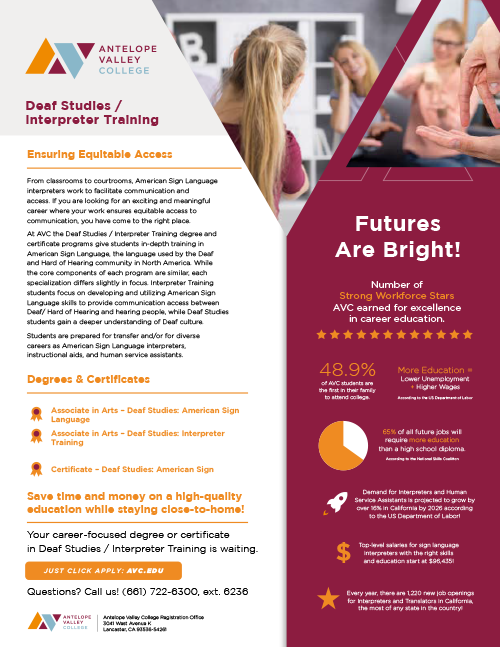Deaf Studies - DFST
Students who complete the associate degree have enhanced employability working with the Deaf community in settings such as social work and education. They are well prepared for full-time, permanent positions rather than temporary, on-call positions. The associate degree will provide students with a broad range of knowledge with which to evaluate and appreciate American Sign Language, Deaf culture, and the society in which they live and with the ability to think and communicate clearly and effectively.
What certificates/degrees can I earn?
- American Sign Language (ASL) Certificate
- Interpreter Training (INT) Certificate
- Associates Degree in American Sign Language
- Associates Degree in Interpreter Training
What will I learn?
The Deaf Studies program can provide the skills and knowledge required to effectively communicate and work with members of the Deaf community. The program focuses on developing and utilizing the linguistic and cultural competencies needed to successfully work with, and provide communication access between, hearing and Deaf or Hard of Hearing individuals. Students who complete the Associate Degree will have marketable skills for employment working with the Deaf community in Deaf-related fields as well as have the foundation needed should they choose to continue their education at a four year university.
What kinds of classes are offered?
Depending on the certificate or degree path chosen, there are a variety of courses offered that are designed to develop abilities in American Sign Language and Interpreter Studies. The DFST 101 (American Sign Language I) course is designed to mainly introduce ASL, a spatial language used by the Deaf community in the United States and Canada as well as, foundational conventions of American Deaf Culture. Courses such as DFST 101L (American Sign Language I Skill Building Lab) are designed to further develop vocabulary, ASL grammar, finger-spelling and basic conversational skills. INT 101 (Principles of Sign Language Interpreting) introduces students to the profession of Sign Language Interpreting, with topics covered such as working in multi-cultural settings, power dynamics of interpreted settings, the history and definitions of Interpreting, modes and methods or interpreting, and the Professional Standards and Code of Professional Conduct. These courses along with the various other courses offered in the Deaf Studies Program, are all designed to enhance your skills for employment in Deaf-related fields.
What are possible jobs in this field?
During recent years, a number of significant legislative and judicial initiatives and directives have appeared at the federal, state, and local levels to ensure that the approximately 500,000 Deaf Americans have full access to public and private programs and services. As social, community, legal and educational services have expanded nationwide, many career possibilities have opened up for persons interested in professional work in Deaf-related fields. The Deaf Studies Program will provide appropriate exposure and preparation to students interested in careers as sign language interpreters, sign language instructors, counselors, government specialists, teachers of the Deaf, community service coordinators/advocates, and many other Deaf-related vocations.
- Sign Language Interpreter
- Sign Language Teacher
- Paraeducator-Certified Interpreter
- Speech-Language Pathologist
Who could hire me?
City, County, State and Federal agencies have increasing demands for Sign Language Intrepreters. Hospitals, schools and varying other industries are in demand for Speech Language Pathologists, Teachers and Paraeducators.
What’s the average pay range for local jobs in this field?
Annual salaries can range from the mid $40,000's and up, depending on the employer, position and experience.
Sounds great! How do I get more information?
Go to the Student Services Bldg to speak with a Counselor for more information on your career options.
Cole Wolf
cole.wolf@avc.edu
661-722-6300, ext. 6236

